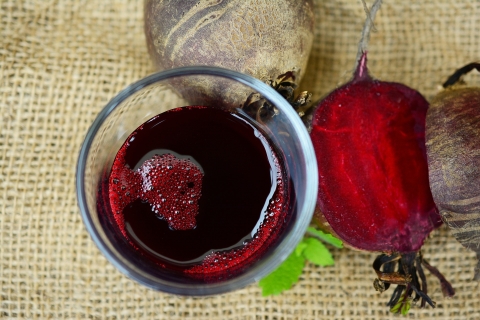

10 September 2019
4 min read
Beetroot could be the next superfood, at least for those with Raynaud’s, a condition affecting about 10 million people in the UK.
Raynaud’s can cause extreme pain and discomfort in the hands and feet, especially during cold weather or in times of stress.
It affects 20 per cent of the population worldwide.
In a small-scale study, beetroot juice was found in people with Raynaud’s to increase blood flow to thumbs, lower inflammation, lower blood pressure and improve the way cells responsible for veins contract and expand.
The research, the first to study the effect of beetroot juice in Raynaud’s, was led by Dr Ant Shepherd, in the University of Portsmouth’s School of Sport, Health and Exercise Science.
It is published in the Journal of Applied Physiology.
Dr Shepherd said: “It’s a small-scale study, but it appears beetroot juice supplements for people with this condition will see improvements.
“Raynaud's phenomenon can cause significant discomfort and pain, so it’s promising that a relatively cheap and easily found substance can improve functioning across four different measures.”
Beetroot is a rich source of nitrates and antioxidants. Athletes commonly take beetroot juice supplements in the belief nitrates can improve exercise performance.
Raynaud's phenomenon can cause significant discomfort and pain, so it’s promising that a relatively cheap and easily found substance can improve functioning across four different measures.
Dr Ant Shepherd, School of Sport, Health and Exercise Science
Dr Shepherd has not studied if the same benefits can be gained from eating beetroot, rather than drinking beetroot juice, but said eating it and other nitrate-rich vegetables are likely to have a similar health-boosting effect.
For those with a severe form of Raynaud’s, conventional treatments include taking medication to relax the blood vessels, allowing more blood to flow, warming the fingers and toes.
Such drugs often become tolerated by the body, so a person needs to take higher and higher doses for any effect. Headaches are a common side effect of these drugs.
People do not become accustomed to the nitric acid from beetroot juice, so they don’t need to increase their dose over time for the same effect.
Dr Shepherd said: “Beetroot and lots of leafy green vegetables are rich in nitrates and that can be turned by the body into nitric oxide.
“I was surprised no one had looked at this before, given the hype around beetroot juice. We know organic nitrates are used to treat the disease routinely, but they have side effects. I wanted to see if inorganic nitrates, found in high concentrations in beetroot, could have a similar effect, given they work on similar pathways and that they have previously been shown to improve blood vessel function and blood flow.
“If beetroot juice supplements could help with the treatment of Raynaud’s we may be able to remove the unpleasant side effects of commonly prescribed organic nitrate-based drugs. If the nitrates and/or antioxidants in beetroot juice can help relieve the pain and discomfort in even only a handful of people with the condition, it is worth considering.”
If beetroot juice supplements could help with the treatment of Raynaud’s we may be able to remove the unpleasant side effects of commonly prescribed organic nitrate-based drugs.
Dr Ant Shepherd, School of Sport, Health and Exercise Science
The 23 people who took part in the study were given either 140ml of beetroot juice or a placebo to drink ahead of numerous visits to climate-controlled labs for a series of tests.
The functions tested included cold sensitivity tests, in which their hands and feet were cooled then filmed with a thermal imaging camera as they re-warmed. Researchers also tested blood and saliva to measure oxidative stress and inflammatory markers; peripheral blood flow; blood pressure; endothelial function; changes to skin temperature; how acceptable the drink was to taste and whether participants felt it had an effect on their health.
The results showed those who took the beetroot supplement for two weeks saw:
- About 50 per cent increase in blood flow to their thumbs following rewarming compared to blood flow before taking beetroot juice;
- Systolic blood pressure was lowered more by the nitrate-rich beetroot juice (~6 mmHg);
- Blood vessel function in the forearms was improved by about 20 per cent;
- And an anti-inflammatory protein in the blood more than doubled. Improvements in anti-inflammatory status are likely to help many of the body’s processes, including increasing nitric oxide availability which in turn helps blood flow and blood vessel function, further lowering blood pressure.
Dr Shepherd hopes larger studies will now follow.
